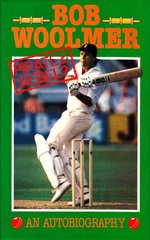Pirate and Rebel? An Autobiography
David Taylor |Published: 1983
Pages: 160
Author: Woolmer, Bob
Publisher: Arthur Barker
Rating: 3 stars

His playing career ended thirty years ago, so it’s no surprise that the late Bob Woolmer is better remembered as an innovative coach for Warwickshire, Pakistan and South Africa than he is as a cricketer for Kent and England. This memoir, written right at the end of his playing days – although before he had actually announced his retirement – looks back on what many would see as a somewhat unfulfilled career. If that is so, the reasons are candidly stated in the title, along with that question mark, to let the reader decide.
Born in India but schooled in Kent, Woolmer debuted for the county in 1968 at the age of 19. For the first few years of his career he was a medium-fast bowler who batted at eight – and it was in that role that he first played for England, in the Prudential Trophy series against Australia in 1972. It was only a couple of years after that that he was moved up to a top-order spot with Kent, and not without misgivings from his team-mates – but he soon hit his maiden century, and added two more that season. A year later he was playing Test cricket, making what was then the slowest hundred for England at the Oval, in what was the last six-day Test played in this country. His epic knock of eight hours 15 minutes, made after England had followed on 341 behind, made the game safe.
There was no tour that winter and the following series against the West Indies was difficult for Woolmer, moved around the order, as it was for England’s batsmen generally – and he was dropped after two Tests on the tour of India which followed, so it is not difficult to see why Woolmer felt, going into the 1977 season, that his place was not secure. He made centuries in the first two Tests against Australia, at Lord’s and Old Trafford, but signed for Kerry Packer’s World Series Cricket at the end of the season, explaining – “in the end I signed for two basic reasons – firstly, for financial security, which was of major importance, and secondly because it excited me to know that I would be playing with people considered to be the best in the world.” In fact he was no more than a peripheral figure in WSC, and it cost him three years out of the Test side. He was recalled in 1980, and again the following season, but the England team had moved on.
Joining the South African Breweries side in early 1982 was a more straightforward decision. Woolmer was 33, and had been dropped twice in as many years by England; his ambitions of captaining Kent had been frustrated; and he already had an affinity with the Republic having spent several winters there playing and coaching. In a chapter entitled ‘No to Apartheid, Yes to Cricket’ he states – “put simply, my opinion is this: apartheid is heinous, but South Africa should be brought back into Test cricket and should have been permitted to return some years ago.” The reasons he gives for this assertion are largely to do with the efforts, considerable to be fair, that South Africa had made by 1984 to make cricket in their country multi-racial. I don’t buy his arguments and I didn’t then – the world had moved on too much, knowing as we did of the plight of Nelson Mandela and the fate of Steve Biko – but at least he takes the trouble to make them, and does so eloquently. An interesting book, largely free of rancour and regret, this is a reminder of the talents of someone lost to the game far too soon.






Leave a comment